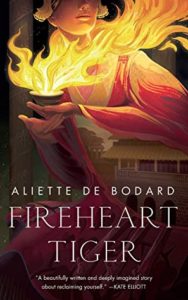
Aliette de Bodard has been all over the sci-fi/fantasy awards lists for the past decade—with three wins each in the Nebula and BSFA Awards and nine Hugo nominations by my count—but for whatever reason, I’d been yet to find any of her work that really stuck with me. But this year’s Hugo voting has given me another opportunity to try, with Fireheart Tiger appearing on myriad “best of the year” lists and becoming a finalist for Best Novella.
Fireheart Tiger tells the story of Thanh, an overlooked third daughter looking to prove herself in negotiations with the faraway empire of Ephteria, whose trade pumps vital wealth into her land, but whose increasingly onerous demands cast doubt on whether Thanh’s people can survive their allyship. Complicating things further is Ephterian Princess Eldris, a former lover who has joined the negotiation party with the intent of rekindling her relationship with Thanh.
Between the politics and the interpersonal relationships, there’s a lot going on here, and I think the story would’ve benefited from some combination of paring some subplots and expanding others. But the exploration of a toxic relationship that was central to the novella was strong enough to carry the whole piece a good distance, even if other elements were underbaked.
The lead walks a fine line between being thoughtful and politically savvy and being impetuous and foolhardy. She repeatedly generates astute political insights, but a rocky relationship with her mother—who has a long and illustrious political track record of her own—sees her repeatedly overstepping her authority rather than seeking consensus. And on the personal side, she walks into a relationship with Eldris with eyes wide open about the red flags and the grave consequences that could accompany an ugly end, yet she persists on the strength of lust and the feeling of being desired. It’s a tricky balance to pull off, and I’m not convinced that Fireheart Tiger did. Tamping down Thanh’s perceptiveness would’ve made her predicament easier to understand and suited the novella length. But with her character as written, I felt the story needed significant expansion of her backstory with Eldris to communicate just how it was that she overlooked the warning signs and found herself in a toxic relationship.
But the relationship itself was excellently drawn—though I pity readers who came to the novella expecting the fantasy romance suggested by some of the marketing. Eldris’ self-centeredness and controlling tendencies nicely mirrored her nation’s behavior as a colonial power, and the thrill of a new beginning sent Thanh hurtling past every warning sign until the problem was too big to ignore and too big to escape without enlisting some external aid.
Overall, the central relationship delivers plenty of urgency to keep a reader engaged in the short novella and its striking exploration of toxic relationships and colonialism. And the fantastical elements serve as a nice support for the main plot, though the lead character doesn’t quite strike what seems to be the intended balance between perceptive and rash to really pull everything together. The result is a story with a good core that doesn’t quite hit the level of some of the other Best Novella finalists.
Recommended if you like: exploration of toxic relationships and colonialism.
Can I use it for Bingo? It’s hard mode for Standalone and is also a Book Club book with No Ifs Ands Or Buts by a BIPOC Author.
Overall rating: 15 of Tar Vol’s 20. Four stars on Goodreads.
